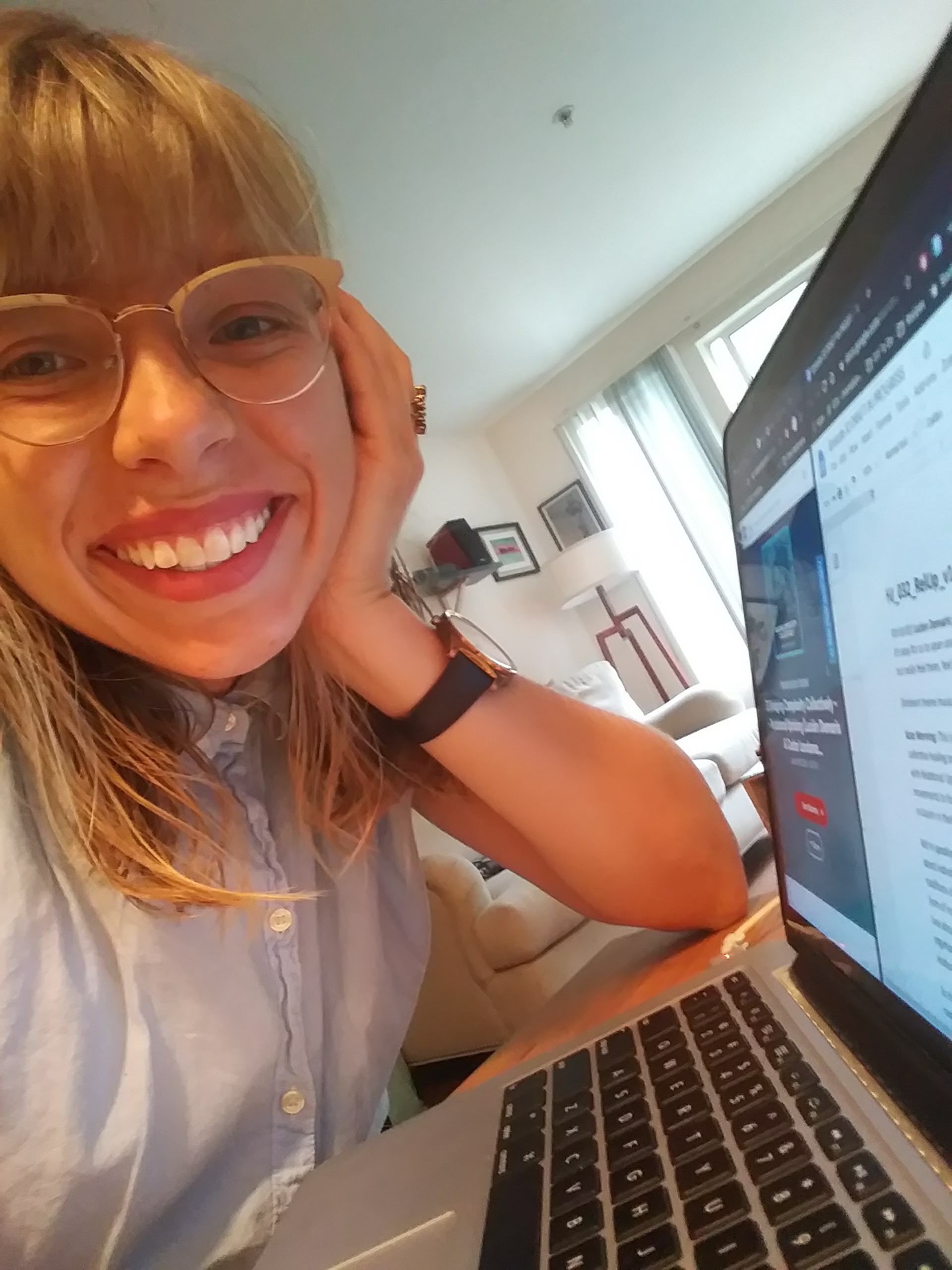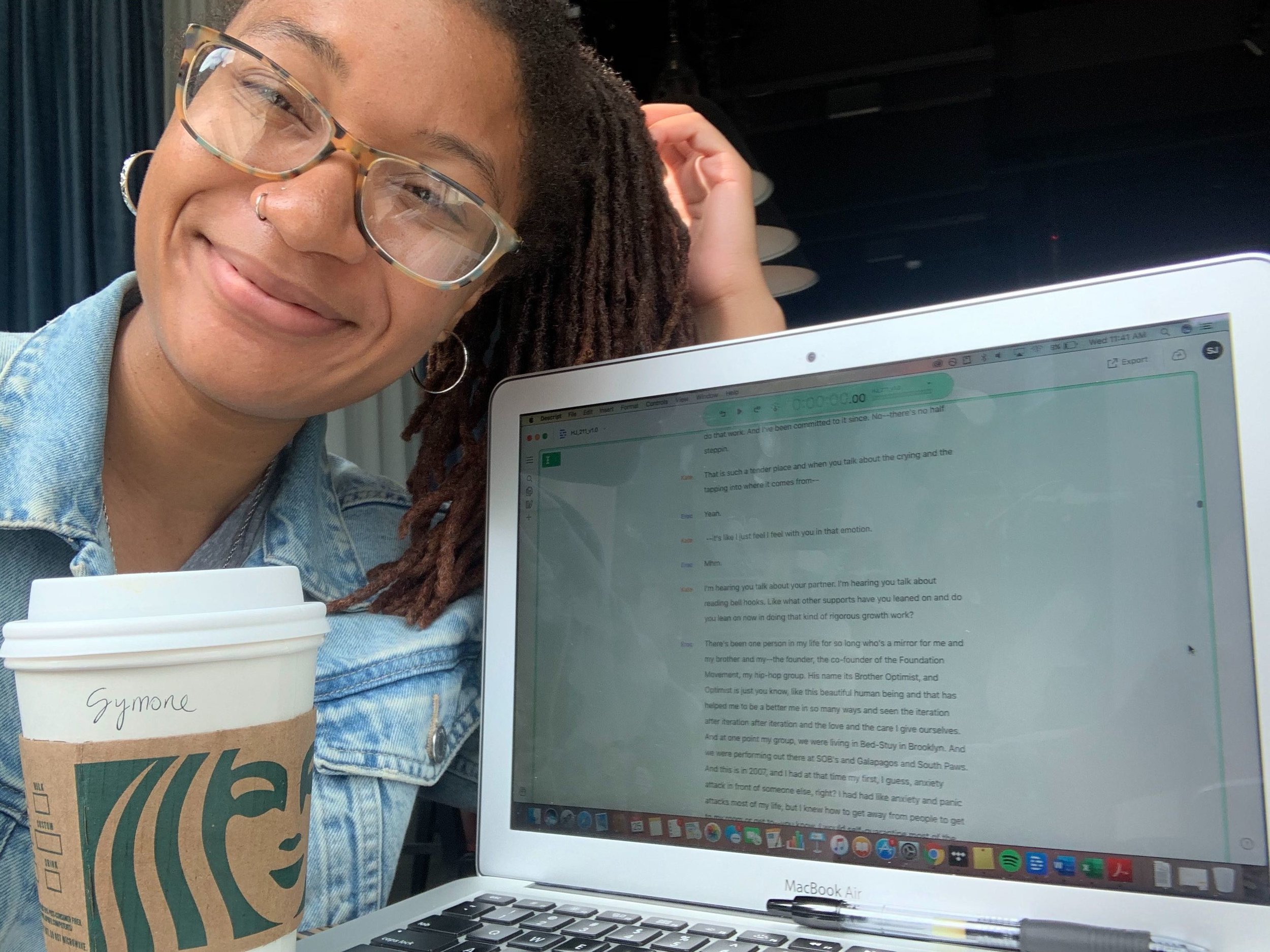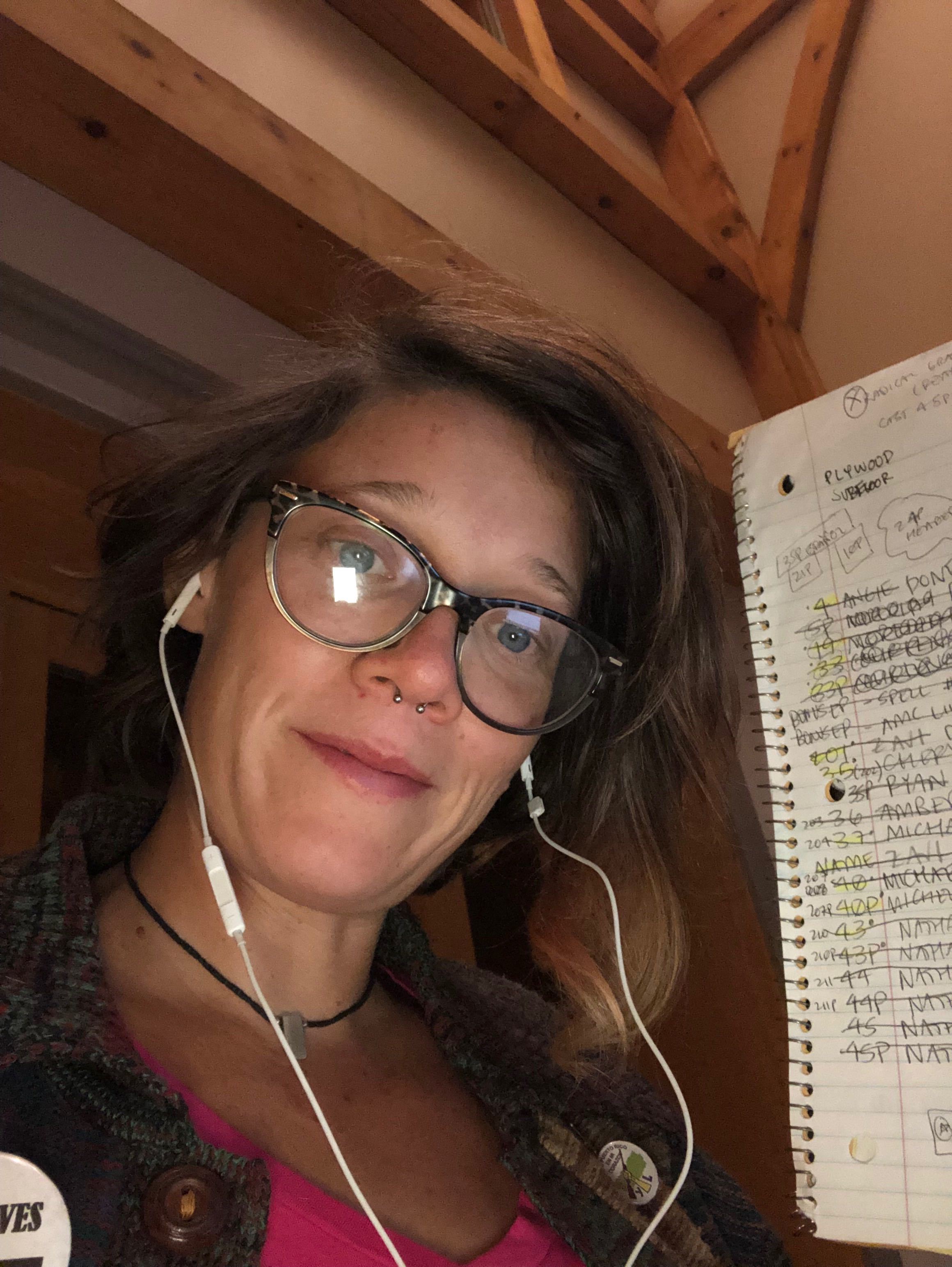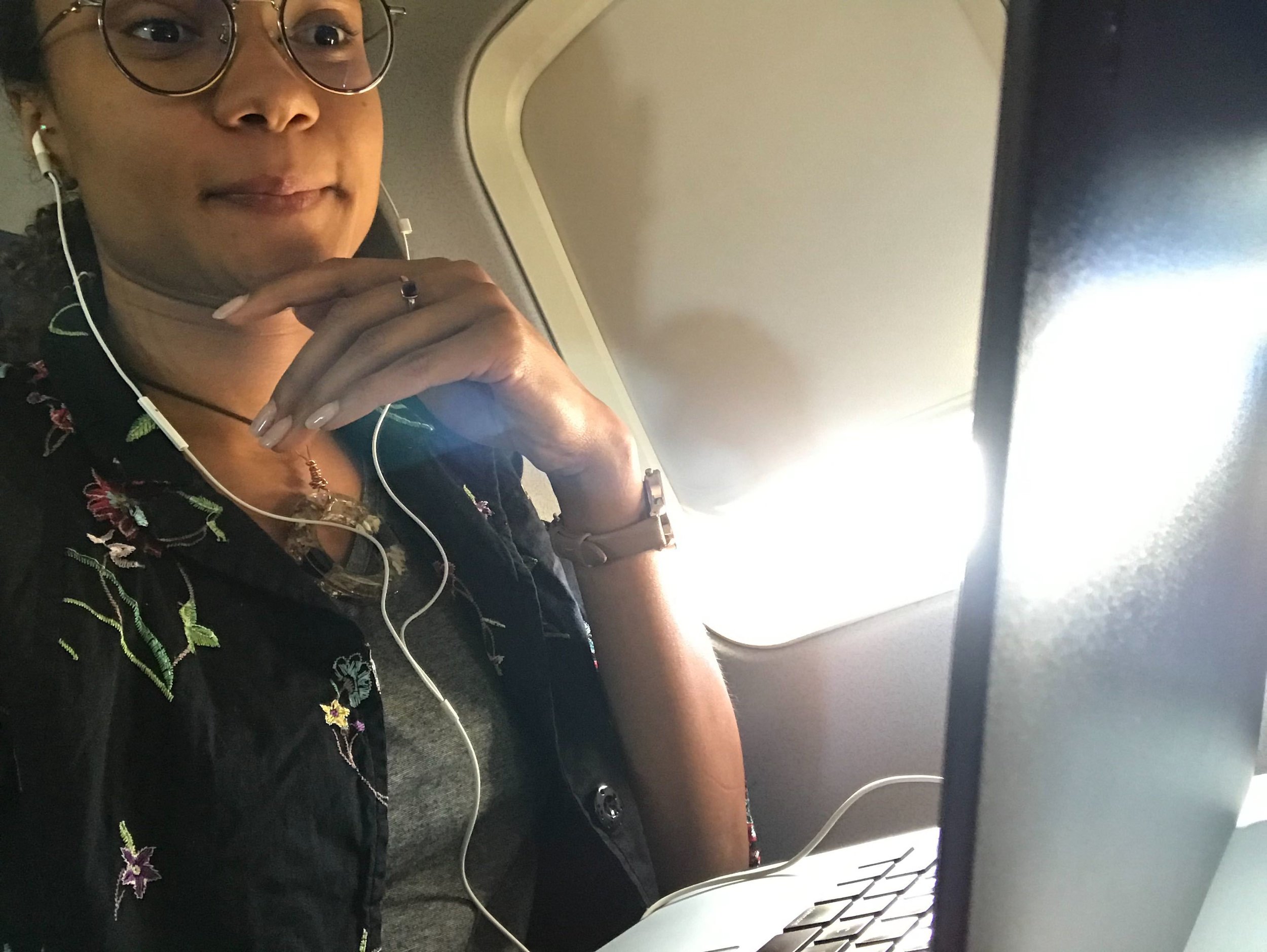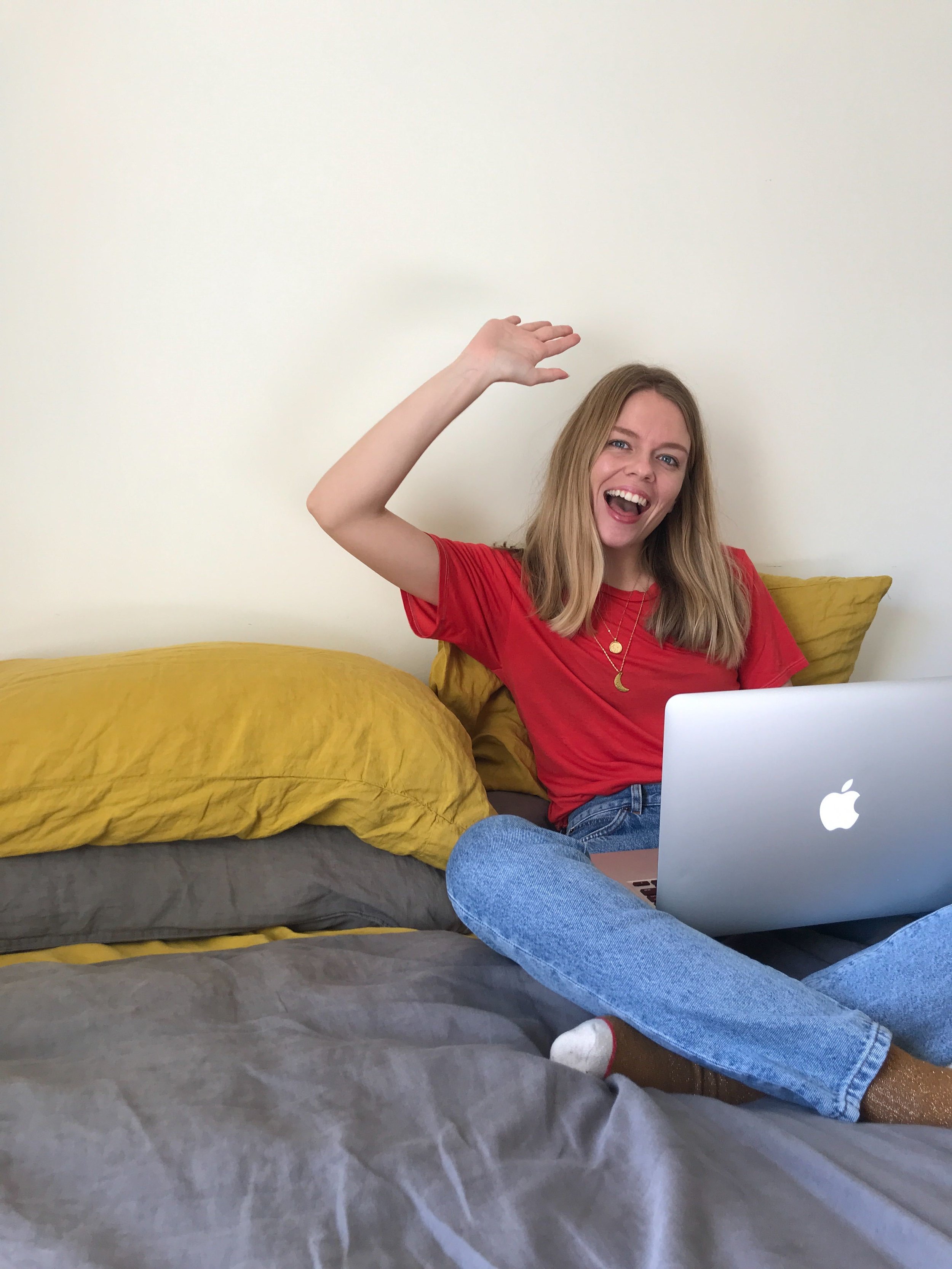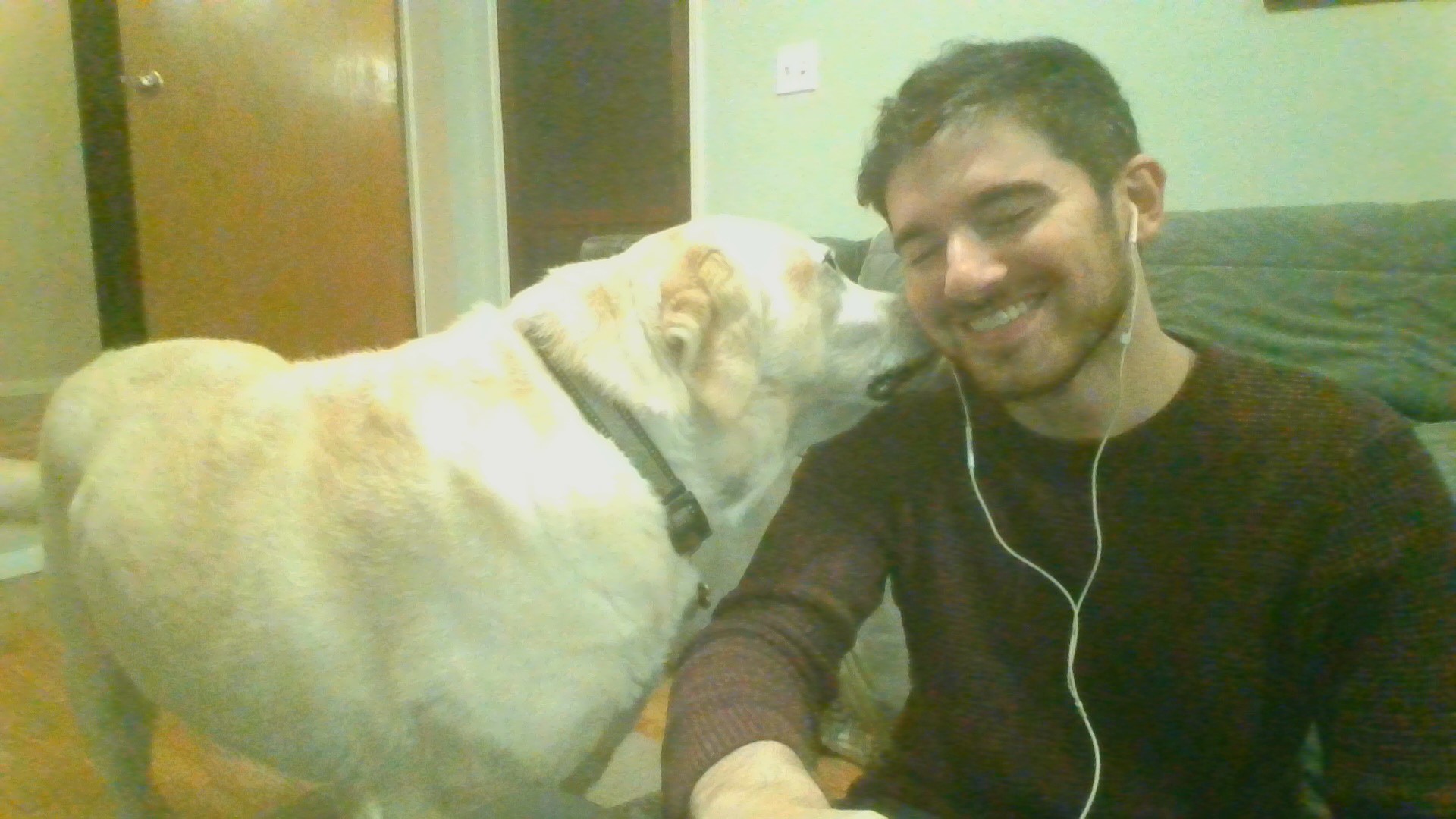Decentralizing Access: Learnings from the Healing Justice Podcast Access Team
Written by Erika Wolf, Michaela Anang, and Kate Werning in October 2019
To hear a conversation between the three of us talking more about this process, listen to “Practicing Access” on the podcast:
Read the Transcript
When Healing Justice Podcast began as an all-volunteer project in 2017, the great hope was that it would create revolutionary access: access for organizers around the country and world to listen in on and be changed by profound practices and stories for engaging transformative work in organizing. Access to tools, meditations, political education, relationships, and audio training, all freely available through any wifi connection. A way to have access to a bigger conversation and an embodied sense of the constellation we comprise together.
But a glaring shortcoming in this commitment to sharing these conversations and practices has been our use of an audio medium without accompanying transcripts. At the beginning, we just didn’t know. Kate googled how to start a podcast and started trying things from there. None of us came out of this medium, and the importance of having transcripts available wasn’t firmly on our radar. This is classic inaccessibility excuse #1: ignorance.
When we realized this gap, thanks to learning more about podcasts and to our listeners who wrote in asking for them over time, we couldn’t imagine how we could possibly produce a weekly podcast with an all volunteer team and transcribe that work, too. We didn’t have the knowledge or expertise, the software access, the people or the time. And we definitely didn’t have money to hire somebody - plus, even if we did, how could we justify paying a transcriptionist but not our volunteer audio editors? There was no way we’d have a budget to pay everybody.
Cue inaccessibility excuse #2: “We don’t have the capacity.”
Sometimes “we don’t have the capacity” really means that. It’s real that we don’t have the money, labor support, materials, and skills that we need a lot of the time. This was true for us, and it’s realistic. Most of our profound efforts toward a just world are forced to make miracles out of no capacity every day, and we can’t be everything at once.
And yet, even when we have very little, we make choices about where we invest the capacity we do have. Ableism is normalized that way - access is deprioritized and thought of as the “extra” thing we couldn’t possibly stretch to do, even when we stretch to do impossible things on the daily.
We’ve heard so many of our guests talk about how disability justice is a central part of healing justice -- after all, who in our world is more expert in healing, subverting, and advocating than disabled folks? And so even though the money, skills, and labor didn’t change, as we watched our backlog of untranscribed episodes rack up, we had to turn and face this challenge.
Access Team Coordinator Erika Wolf moved into formation, and their presence provided just enough support to really dive in together. As organizers and trainers, we knew to transcribe 100+ episodes we’d need to develop a lot of leaders, and were excited about the prospect of sharing this skill and deeper awareness of disability justice and accessibility among our listeners. We chose to create capacity out of no capacity by widening our volunteer base and asking for help, creating a scalable training and distributed digital system for team transcription, and working our asses off.
We tried a lot of things, and in the end we produced 110 transcripts in 8 months with 100 total (56 very-active) volunteers around the world. Here’s how we did it.
How we did it: a global volunteer Access Team
TEAM STRUCTURE
Getting to launch day with 110 transcripts live as of October 1st, 2019 comes after an epic adventure of research, hard work, trial and some errors. We began with a group of 4 in summer 2018, typing out one transcript at a time by hand. (HUGE SHOUT-OUT to those early volunteers!) After a few transcripts were generated in fits and starts, we realized this project needed more structure and a person to coordinate the volunteer labor.
Growing our team came in phases. Access Coordinator Erika Wolf joined us in December 2018 and began to hold the leadership and coordination of this giant project. We put out a call via our email list and Instagram for volunteers, and were shocked -- the first ask generated over 40 signups! When we shared it again, another 50 joined… and eventually now we have 160+ people on that signup form. We were blown away by the willingness and interest to support in this behind-the-scenes way, and folks’ desire to get more deeply connected to this content.
We knew that we needed to build a culture that would hold the team together as well as hold space for the learning and adapting necessary to generate over 100 transcripts on such varied topics and from such a diversity of speakers. Transcriptionists signing up for the team were coming in from all over the world (ALL the continents except Antarctica!), involving many time zones and many different cultural and linguistic backgrounds.
Once we figured out the technology (Slack / Descript / Zoom / Google Drive - more detail below), Erika and Kate onboarded volunteers in waves through live video orientations and trainings on Zoom. This allowed us to give a warm personable welcome, for folks to meet each other, do political education and skill building around disability justice, and train volunteers in our processes.
An enormous tool in this process which grew and evolved with us was our Transcriptionist Manual. We developed a first round manual for transcriptionists doing first drafts, and later a Transcript Editors’ Manual for transcriptionists who graduated in commitment and skill to doing the second round edits and formatting processes. (We have combined them both into an Open Source Social Justice Transcriptionist Guide to share with YOU!)
After getting the hang of timing and screensharing and the wording of the training calls, we were able to onboard even more folks by recording these sessions and sharing them via email with new recruits that came in the third and fourth waves of recruitment. The team grew and over 100 people took the trainings and learned from our manuals, ready to apply their skills here and also in their local movement contexts.
TECHNOLOGY
Initially Host/Director Kate Werning, along with support from JD Davids, had gathered a few volunteers to type out transcripts manually in GoogleDocs while listening to audio via the platform of their choosing. This extremely tedious process proved difficult, both in producing the transcript and in managing the work. Folks produced drastically different drafts in varying styles with no real support for an editor to check their work.
When Erika Wolf came on as Access Team Coordinator, we had already upgraded the tech to support volunteers by getting a membership to Descript, an online cloud-based platform for audio editing and transcription (thank you Rachel Ishikawa for getting that started!). This mostly user-friendly software generates a rough (read: sometimes REALLY rough) draft of uploaded audio so that transcriptionists had some base text to edit, rather than initiating the daunting task of filling a blank page with up to 20 pages of dialogue. Descript has some other pretty slick features which have come in handy as we grew our volunteer transcription team from just a couple to over 100 in a matter of months.
The two main reasons we chose this software is because each file can be shared, similar to Google Drive, and have live edits show up and save immediately. This protected us from having to chase down work when volunteers dropped off, ensuring we could always see the most up-to-date versions. Descript also matches the audio playback with the transcript, so if you are editing a specific section you can hit ‘play’ to hear the audio right at that exact moment and compare it.
Ultimately, we have mixed feelings about Descript - the automated first draft generation is now free, which is amazing, with a $10/month membership. That’s super affordable, and the functionality is great. However, we probably had to put in about 15 support ticket requests during this process, resulting in bottlenecks for our volunteers, delays in waiting for a response, frustration, and occasionally lost work. There are other strong options for automated transcription software - let us know what ones you like.
Slack is another platform that has been key to our team-building, our ability to troubleshoot and adapt new practices collectively, and keeping messages organized about who needs and will do what. We started channels for #access-team, #transcript-editors, and also a #random channel where we shared Descript automated transcript bloopers (“acupuncture” → “and you punch her”; “We have the ability to ensure food is a human right” → “We have the ability to ensure that food is a human. Right?”... the list goes on).
We also chose to post our transcripts as view-only links to Google Docs, so that as we receive feedback and potentially need to make minor edits, we can do so . Check out how they’re posted on any of our podcast episode pages.
WORKFLOW
Our transcripts are touched by 3 people before they are released into the wilds of the internet. A transcriptionist volunteer generates a first draft by editing in Descript, with the ability to leave questions about where they are stumped or unsure for the editor. Then, an editor comes through to check spelling and grammar, clear any questions or inconsistencies of the draft, and format the final version by changing fonts, inserting hyperlinks, and converting the draft into a GoogleDoc view-only link. The final gets a once over and then our web team inserts the link into the episode page on our website. You can see what these look like by clicking on any episode at healingjustice.org/podcast
For such a diverse group of volunteers to create consistently simple and accurate transcripts, Access Team members are provided with a manual. Two actually. One manual is designed for transcriptionists, which orients them to all pieces of technology they’ll need to use to be on the team, as well as a style guide for how to conform their drafts to an almost verbatim transcript. The other manual is for the Editors’ Circle, which walks these folks through the additional tech they’ll rely on to complete their tasks and tackles even more specific stylistic guidelines. See an open source version of these two manuals combined for your learning and use.
Both manuals are really tied together by the presence of our Access Team community in Slack. The community conversations, especially being used as a forum for asking questions not directly addressed in the style guide, continues to fine tune our research of best practices in disability justice and culturally competent transcripts on an almost weekly basis.
To hold a feeling of community among a group that is distributed throughout many timezones, we rely heavily on opportunities to connect as people doing the work, engaging in a practice of dismantling ableism. Protecting a space for folks’ whole selves to show up in each place where the group collaborates supports our culture of authentic inclusivity. Through video conferencing platform Zoom not only did we conduct our trainings, orientations, and regular check-in calls, but we experimented with creating a co-working space, hosted by the team coordinator, for transcriptionists and editors to meet each other, talk through their experiences, and work side-by-side, remotely.
What makes it social justice transcription?
Underlying our tools and culture are our social justice principles, rooted in disability justice and pushing us to understand the frontlines of inclusive language. We’re also in conversation with our guests about how they want to be represented. For example, when our guests use jargon specific to their field, it’s critical to the Access Team that we confirm if these words ought to be capitalized, spelled, or punctuated in a specific way.
In order to arrive at editorial decisions such as whether to capitalize Black or white in a racial or ethnic context, we have leaned on the advice of social justice and media leaders who write on the topics - and you can see some of the resources that have inspired us in the first part of our open source transcription manual.
Our research into best practices has been stretched often as transcriptionists are constantly encountering language in the conversation of our episodes which isn’t directly addressed in the style guide. Folks are writing into the Slack questions such as: do we capitalize “indigenous”? How do we indicate that words are sung or read rather than spoken spontaneously? When someone speaks in a language other than English, should we italicize it? Should we attempt to convey varied pronunciations, accents, and “verbal typos,” or adjust them for more standard English? Which honors the speaker’s full expression most?
Over the seven months that this international team of differently abled volunteers has lovingly created this beautiful volume of transcripts, we have grown, struggled, adapted, learned, and loved together. What we’ve been able to bring into existence is due to the diligent focus and detail-oriented dedication of so many volunteers. When we could have just guessed or not cared what to capitalize or punctuate, or where folks could have just left the decision-making to an editor or to the team coordinator, the Access Team has led with their hearts and taken very seriously the responsibility of holding space for folks using these transcripts. Each of these incredible volunteers has shown a commitment to get the job done in the most useable, respectful, and inclusive way they are able, and to revisit, fine tune, listen, and adapt. That kind of permeability, care, and willingness to iterate is ultimately what it takes to embody justice principles in community.
Where we’re still growing
We seek to expand our dexterity in co-creating more accessible spaces. We eagerly await the feedback to our year of work on this project, in order to continually grow in solidarity and access-seeking. We hope to build the frameworks we have primarily used in an online space into more of our work out in the world, to hold ourselves accountable to what should be built into our structures, to dismantling ableism and organizing for a more just and accessible world.
What we learned
As a team of volunteers of varying identities, abilities, communities, locations, and so many more intersections, members of the Access Team have been able to approach the work from wherever is most accessible for them. This is, again, a labor of love, and carving out the time and space for it is something we’re learning to organize and plan around. Whether a volunteer took on one transcript or 30, the shared workload and support continues to highlight the ways we can show up for each other.
As a group, we learned that we can all be a part of creating more accessible spaces. We’ve learned to slow down some processes as needed. As disability justice teaches us, rushing through the timing is not always accessible, growing or care-oriented. So we’ve learned to slow down, to focus in on what can make this work accessible to team members and to the larger public.
We have run a project that has very measurable outcomes with a deadline (a huge volume of transcripts completed by a certain date) with an adaptiveness to emerging health and access needs, team members sharing that they’re on crip time, normalizing and destigmatizing needing to pass things off multiple times, taking way longer than planned, and pushing back our deadlines by a few months. Some transcripts required being passed off to 6 different people before they were ready to go, and having a team this broad and a timeline we were willing to slow down is what made that very important adaptability possible.
It has been a growing experience for us. For many, taking a deeper and more nuanced listen to the content of a podcast episode has formed a deeper understanding of the work of those featured on the podcast. It has facilitated deeper connections to our own work. We continually process and pull apart the mechanisms of oppression internally or in our communities as we intake and deeply listen to practices, resources, and sharing of knowledge and experience.
Calling on a community of volunteers who are dedicated and passionate about both the content of the podcast and expanding accessibility to that content has been a labor of love. We have noticed the care that is needed in communicating on certain topics-- from looking at the specifics of spelling, to noting pauses and spaces a speaker takes -- both the large and small arcs of how we tell each other what needs to be said. We have had to hold the voices of those featured and carefully transmit them to the audience members in our community who will benefit from transcript access.
We’re also positioned to notice and appreciate our overlap in community. Communities and individuals have their own unique expression and modalities of changing oppressive structures in our world, but regardless of geographic or demographic difference, there are folks of any and all communities pushing toward some pretty core goals: healing and justice. On the Access Team, taking a deeper dive to listen to each other carefully, with attention to all the nuance, gives us more expansive grounding for intentionally figuring out how to care for our whole selves and whole communities.
We have researched, resource-shared, become more understanding listeners. Team members approaching this work with no transcribing experience find a welcoming, collaborative group via the Slack channel. Members are eager to support each others’ successes (e.g. finishing a first transcript! *insert celebratory emoji here*), and questions and concerns (e.g. “Can someone give this part another listen too? I want to make sure I have the wording correct”).
We share great gratitude to all of our fellow Access Team members, and to our community, many of whom have been impacted by our lack of transcripts up until this point, for your patience and grace. We see you.
Where do we find these magical transcripts?
Check out the section of our website where every episode has its own page with its corresponding transcript, audio, resources, and more info about our guests at www.healingjustice.org/podcast. Since our access launch in October 2019, full transcripts were posted at the same time our new episode releases each week.
Access Team consistED of many brilliant volunteers worldwide. Thank you to:
Access Team Coordinator Erika Wolf
Advisors Shelby Seier, JD Davids, Doris Quintanilla, Kaylee Knowles, Parke Ballantine, Rachel Ishikawa, Rebecca Brooker
Transcription Volunteers: Abby Burkland, Alina, Amy McMurtrie, Angeli Bhatt, Ashley Kuenneke, Cara Carrillo, Carla Wilson, Carmen Cool, Charly, Claire Charamnac, Clarissa Worcester, Emptea, Gladys, Jalisa Whitley, Jamala Wallace, Jasmin Maurer, Julia Rosenfeld, Kate Ericksen, Kate Foster, Laura Kakalecz, Laura Webber, Lauren Milburn, Lena Schützle, Lia Bentley, Lisa Cathelyn, Lyndi Woo, Lyrica, Madalyn Wacilczuk, Meg Mszyco, Mia Rotondo, Nadia Maria Nacca, Naomi Solomon, Noelle Morschauser, Paige Carlson, Phoebe Gardener, Reneé Daniel, Salomé Navarro, Sascha, Shelby Seier, Siobhan Laughlin, Symone Johnson, Val Smith
Transcript Editors’ Circle, aka the Transcription Underground: Amber Harvey, Angie Wolfrum, Courtenay Howe, Emily Wheeler, Erika Wolf, Erin Taylor, Greta Spoering, Jayden McClam, JD Davids, Matt Allison, Meredith Nicholson, Michaela Anang, Michelle Martin, Nathalie Folkerts, Ryan Parigoris, Sonja Thalheimer, Zavi Kang Engles
Thank you to Resist for an Accessibility grant that supported part of this process, and our most reliable and meaningful source of funding, our monthly sustainers on Patreon.

